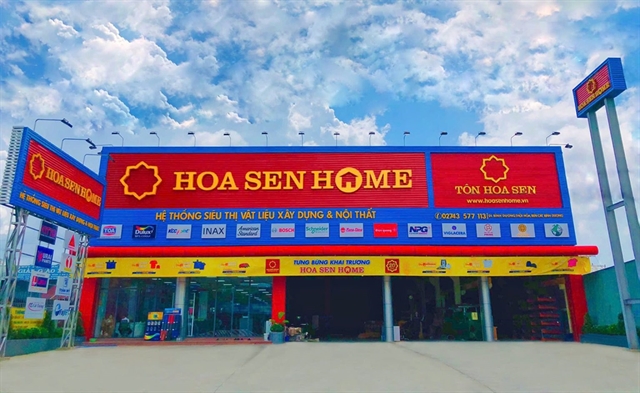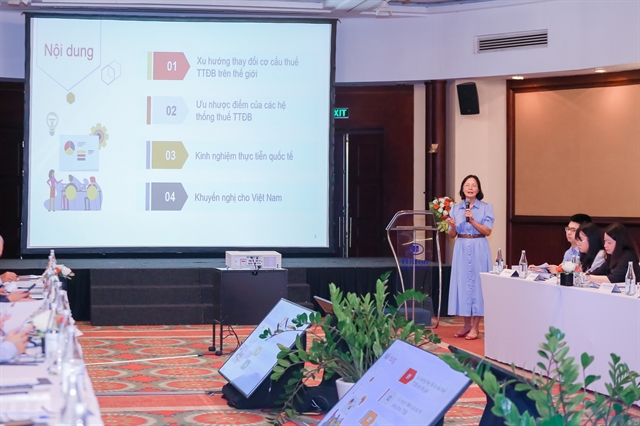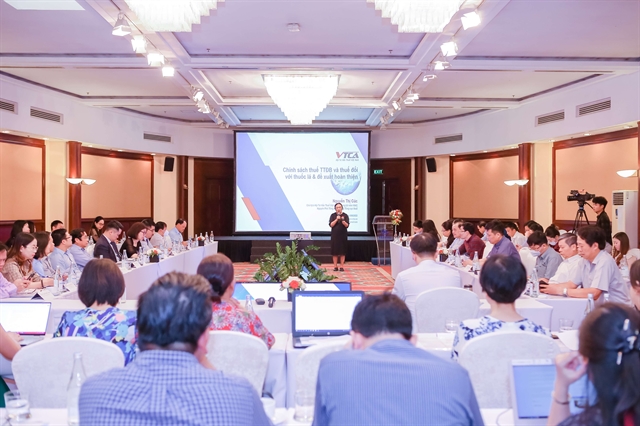 Economy
Economy

 |
| Đinh Thị Quỳnh Vân, general director of PwC Vietnam, makes a speech at a conference, saying that a sudden tax increase may lead to undesirable reactions from tobacco consumers, namely, switching to more toxic products which are cheaper with lower quality. |
HCM CITY -- Simplifying the excise tax structure on tobacco will facilitate tax administration, reduce opportunities for tax avoidance and evasion, increase the government’s revenues, and have a greater impact on reducing tobacco use, experts have said.
The recommendation comes amid the context that the Government approved the tax reform strategy for up to 2030 which sets the orientation for switching from an ad valorem tax system to a hybrid tax system for on tobacco among other products subject to excise tax.
A number of suggestions have been collected, and most agree that a hybrid tax system that includes ad valorem and specific taxes is the most simple and effective one.
In a recent report titled ‘Study on the Special Consumption Tax System,’ PwC Vietnam called it “The right direction in line with the general trend in the world.”
According to the report, the Government has lost revenues due to tobacco smuggling, especially in 2016-17.
The total tax loss due to smuggled tobacco consumption has reached nearly 9 per cent of tobacco tax collection, and tax collection of tobacco remained unchanged in 2006-20 period without factoring in inflation, the report said.
Based on the analysis of the current excise tax policy, the objectives of the government and tax policies in comparable countries, it outlined a number of options for SCT reform along with roadmaps for the short and long terms.
The first option is transitioning into a hybrid tax system then gradually increasing the specific component and decreasing the ad valorem component, at an appropriate time in future, considering to move to a single-tier specific tax system when being suitable.
The second option is transitioning into a multi-tier specific tax system and then gradually narrow down the number of tiers to become a one-tier specific system.
Both options have both advantages and disadvantages, but PwC Vietnam believes that the first is more reasonable for Việt Nam in general.
It is also consistent with the reforms proposed by the Ministry of Finance, PwC said.
Nguyễn Thị Cúc, chairwoman of Vietnam Tax Consultants’ Association (VTCA) at the Workshop "Special Consumption Tax - Harmonizing State Budget Revenue Regulation and Business Development” held in August 2022 in Hà Nội proposed that the tax increase on tobacco products should follow a proper road map so that enterprises could adjust their operations and production would not suffer.
“That means in addition to the 75 per cent tax rate, the specific tax rate can be applied at VNĐ1,000 per pack. Then it will be increased gradually from VNĐ1,000 to VNĐ1,500 per pack in the next two years. From the fifth year, it can be increased to VNĐ2,000.”
 |
| Nguyễn Thị Cúc, chairwoman of VTCA says at conference that the tax increase plan needs to be long-term oriented with a reasonable roadmap in order to harmoniously achieve the government's goals. — VNS Photo |
In fact, the mixed excise regime is used in many markets.
A 2021 report by WHO said countries tend to switch to an excise tax structure based on specific or mixed taxes (up 22.5 per cent from 102 countries in 2008 to 125 countries in 2018 - accounting for 69 per cent of the countries in the statistics). Meanwhile, the number of countries with the ad valorem excise regime decreased by 25 per cent in the above period (from 55 to 41).
WHO recommended that, in future, countries that currently apply the ad valorem tax like Việt Nam should first start transitioning to the mixed excise regime by adding a specific tax component or introducing a minimum special excise tax rate.
Towards 100 per cent change to specific tax
Although the mixed excise regime is the best choice for Việt Nam at the current time, over the long term however the specific tax is highly recommended.
In the long term, the PwC report suggested, Việt Nam will gradually move towards a specific tax system after 10 or 15 years.
The company said the specific excise tax regime is superior to the mixed or ad valorem regimes because the tax collection would be based on the volume of tobacco consumed.
The specific tax structure also helps avoid the problem of large differences between production and the retail prices, it said.
But in order to smoothly change to the specific tax system, the Ministry of Finance should consider gradually increasing the specific tax component and reducing the relative tax component to encourage investment in improving product quality, it said.
Then the difference in tobacco prices would gradually narrow, facilitating a switch to the specific excise tax regime when the time is right.
Đinh Thị Quỳnh Vân, general director of PwC Vietnam, said it is necessary to increase taxes according to a roadmap and with transparency. The increase should be higher than the inflation rate, and increasing the excise tax especially on cigarettes should be done step by step, she said.
The plan to increase excise needs to have a reasonable roadmap and long-term orientation to harmoniously achieve the government's target of limiting tobacco consumption but also ensure the stability of revenue collection and prevent a surge in smuggling of cigarettes, thereby supporting the transformation of the tobacco industry, she said.
Việt Nam has long borders with Cambodia and Laos, which makes it difficult to control smuggled cigarettes.
According to the Asia Illegal Tobacco Index, in 2017 more than 24.3 billion illegal cigarettes were consumed in Việt Nam, or 23.4 per cent of total tobacco consumption.— VNS